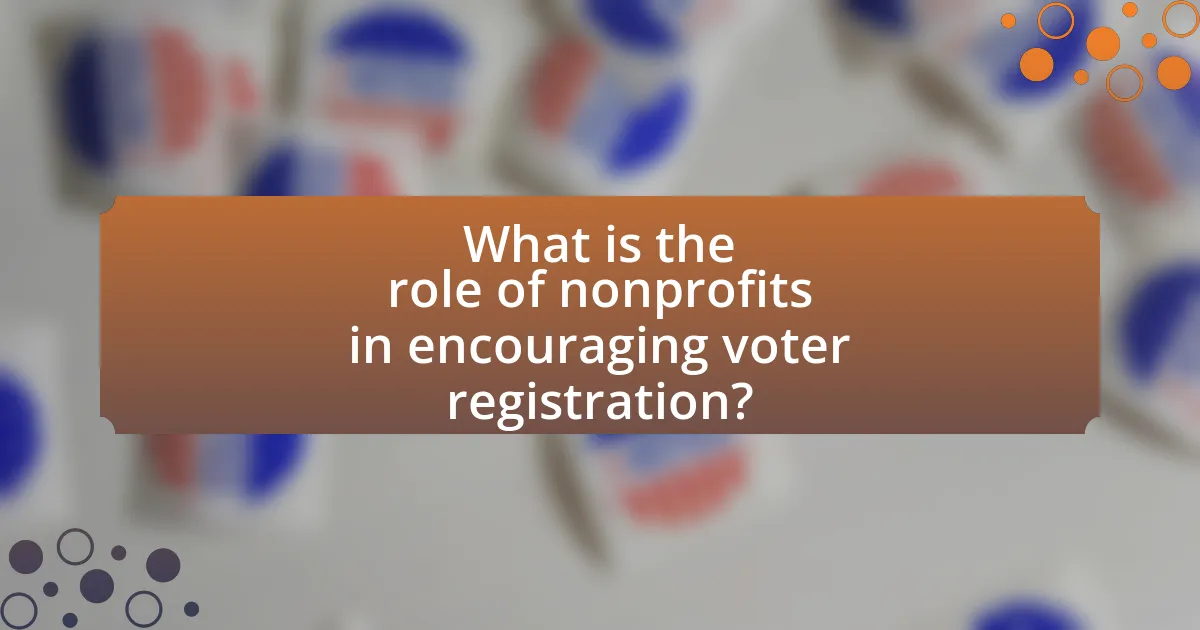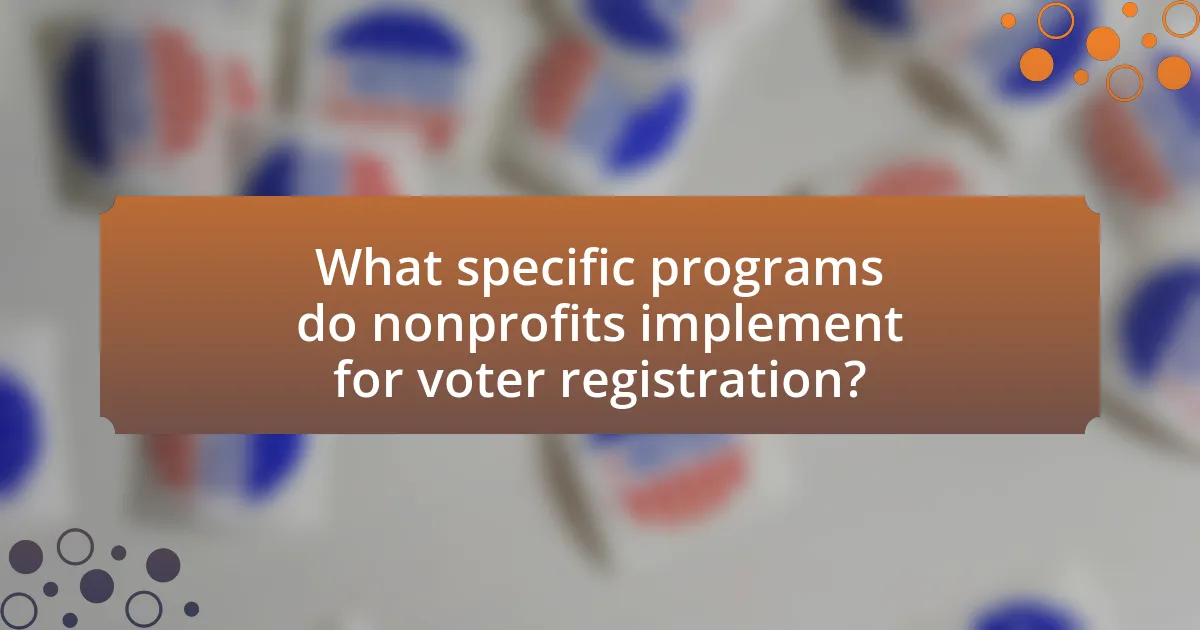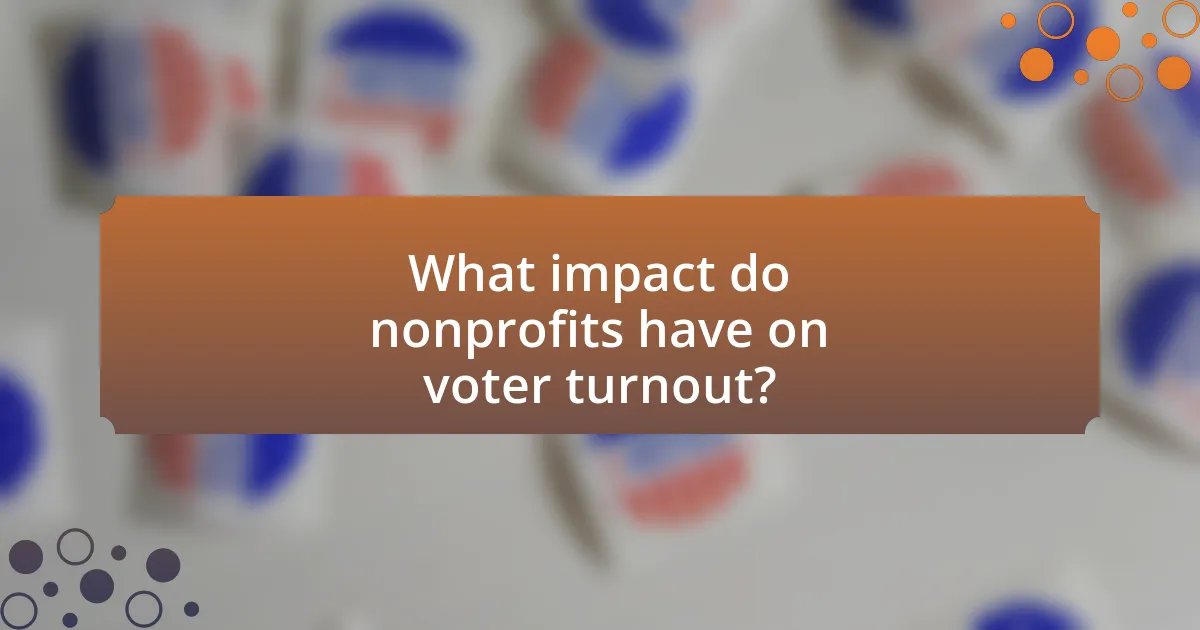Nonprofits play a vital role in encouraging voter registration by implementing outreach programs that educate and assist individuals, particularly in underrepresented communities. These organizations utilize various strategies, including grassroots mobilization, educational campaigns, and partnerships with local entities, to increase registration rates and enhance civic engagement. Nonprofits also address barriers to registration, provide unique resources, and tailor their approaches to meet the specific needs of different communities. Despite facing challenges such as limited funding and regulatory hurdles, their efforts have led to significant increases in voter registration and turnout, demonstrating their essential contribution to the electoral process.

What is the role of nonprofits in encouraging voter registration?
Nonprofits play a crucial role in encouraging voter registration by implementing outreach programs that educate and assist individuals in the registration process. These organizations often target underrepresented communities, providing resources and support to overcome barriers to registration. For instance, the National Voter Registration Act of 1993 allows nonprofits to facilitate voter registration, which has led to millions of new voters being registered through their initiatives. Additionally, studies show that nonprofit-led campaigns can increase registration rates by as much as 20% in specific demographics, demonstrating their effectiveness in mobilizing citizens to participate in the electoral process.
How do nonprofits contribute to increasing voter registration rates?
Nonprofits contribute to increasing voter registration rates by implementing outreach programs that educate and assist individuals in the registration process. These organizations often target underrepresented communities, providing resources such as workshops, online tools, and one-on-one assistance to navigate the registration system. For instance, a study by the National Voter Registration Act found that nonprofits helped register over 1.5 million voters in the 2020 election cycle alone. By mobilizing volunteers and leveraging social media campaigns, nonprofits effectively raise awareness about registration deadlines and the importance of voting, thereby enhancing civic engagement.
What strategies do nonprofits use to engage potential voters?
Nonprofits engage potential voters through strategies such as grassroots mobilization, educational campaigns, and partnerships with community organizations. Grassroots mobilization involves organizing local events and door-to-door outreach to inform and encourage voter participation. Educational campaigns provide information on voting rights, registration processes, and the importance of civic engagement, often utilizing social media and community workshops. Partnerships with community organizations enhance outreach efforts by leveraging existing networks to reach underrepresented populations. For instance, organizations like the League of Women Voters have successfully increased voter registration through targeted initiatives, demonstrating the effectiveness of these strategies in fostering civic participation.
How do nonprofits tailor their approaches to different communities?
Nonprofits tailor their approaches to different communities by conducting thorough needs assessments and engaging in community-specific outreach strategies. For instance, organizations may analyze demographic data, cultural factors, and local issues to understand the unique challenges faced by each community. This targeted approach allows nonprofits to develop customized programs that resonate with local populations, such as language-specific materials or culturally relevant messaging. Research shows that tailored outreach significantly increases voter registration rates; for example, the 2016 study by the Brennan Center for Justice found that community-based efforts led to a 20% increase in voter registration among targeted groups.
Why are nonprofits essential in the voter registration process?
Nonprofits are essential in the voter registration process because they actively engage communities, promote awareness, and facilitate access to registration resources. These organizations often target underrepresented populations, helping to overcome barriers such as language, mobility, and lack of information. For instance, according to the U.S. Census Bureau, in the 2020 election, nonprofit organizations played a significant role in increasing voter registration among young people and minorities, contributing to a 50% increase in registrations compared to previous years. This demonstrates that nonprofits not only mobilize voters but also enhance the overall democratic process by ensuring broader participation.
What unique resources do nonprofits provide for voter registration?
Nonprofits provide unique resources for voter registration, including outreach programs, educational materials, and community engagement initiatives. These organizations often mobilize volunteers to conduct door-to-door campaigns, ensuring that underrepresented populations are informed about their voting rights and registration processes. For instance, the League of Women Voters offers nonpartisan information and resources that help individuals understand how to register and participate in elections. Additionally, nonprofits frequently collaborate with local governments to facilitate registration drives, making the process more accessible. According to the National Association of Secretaries of State, nonprofits have been instrumental in increasing voter registration rates, particularly among young voters and minorities, demonstrating their critical role in the electoral process.
How do nonprofits address barriers to voter registration?
Nonprofits address barriers to voter registration by implementing outreach programs that educate and assist individuals in the registration process. These organizations often target marginalized communities, providing resources such as workshops, informational materials, and one-on-one assistance to navigate the complexities of voter registration. For instance, the National Association of Secretaries of State reported that nonprofits helped register over 1.5 million voters in the 2020 election cycle, demonstrating their significant impact in overcoming obstacles like lack of information and accessibility issues.
What challenges do nonprofits face in encouraging voter registration?
Nonprofits face several challenges in encouraging voter registration, including limited resources, lack of awareness among potential voters, and regulatory hurdles. Limited funding restricts outreach efforts, making it difficult for nonprofits to effectively promote registration initiatives. Additionally, many individuals remain unaware of the registration process or its importance, which hampers engagement. Regulatory hurdles, such as varying state laws regarding voter registration drives, can complicate efforts and deter participation. These factors collectively hinder nonprofits’ ability to mobilize voters and increase registration rates.
How do funding and resources impact nonprofit voter registration efforts?
Funding and resources significantly enhance nonprofit voter registration efforts by enabling organizations to expand outreach, improve infrastructure, and implement effective strategies. For instance, adequate funding allows nonprofits to hire trained staff, develop targeted marketing campaigns, and utilize technology for data management, which collectively increase registration rates. According to a study by the National Voter Registration Act, organizations with higher budgets reported a 30% increase in voter registrations compared to those with limited resources. This correlation underscores the critical role that financial support plays in the capacity and effectiveness of nonprofits in mobilizing voters.
What legal and political obstacles do nonprofits encounter?
Nonprofits encounter various legal and political obstacles, including restrictions on political activities, compliance with complex regulations, and challenges in securing funding. For instance, the Internal Revenue Service (IRS) prohibits 501(c)(3) organizations from engaging in political campaigning or substantial lobbying, which limits their ability to advocate for voter registration initiatives. Additionally, nonprofits must navigate state-specific laws that can impose further restrictions on their activities, such as voter registration drives. These legal constraints can hinder their effectiveness in mobilizing voters and advocating for electoral participation.
How do nonprofits collaborate with other organizations to enhance voter registration?
Nonprofits collaborate with other organizations to enhance voter registration by forming strategic partnerships that leverage resources, expertise, and outreach capabilities. For instance, nonprofits often team up with local governments, educational institutions, and community groups to conduct voter registration drives, utilizing shared networks to reach underrepresented populations. A notable example is the collaboration between the League of Women Voters and various community organizations, which has successfully registered millions of voters through joint initiatives. These partnerships enable nonprofits to access diverse audiences and provide comprehensive voter education, thereby increasing registration rates and civic engagement.
What role do volunteers play in nonprofit voter registration initiatives?
Volunteers play a crucial role in nonprofit voter registration initiatives by actively engaging in outreach efforts to educate and assist potential voters. They help to identify and reach underserved communities, facilitating access to voter registration resources. According to the U.S. Census Bureau, organizations that utilize volunteers for voter registration efforts can significantly increase registration rates, particularly among young and minority voters. This demonstrates that volunteers not only enhance the capacity of nonprofits to reach more individuals but also contribute to a more inclusive electoral process.

What specific programs do nonprofits implement for voter registration?
Nonprofits implement various specific programs for voter registration, including outreach initiatives, online registration platforms, and community engagement events. For example, organizations like Rock the Vote and the League of Women Voters conduct targeted outreach campaigns to educate and assist individuals in completing voter registration forms. Additionally, many nonprofits utilize online tools to facilitate easy registration, often partnering with state election offices to streamline the process. Community events, such as voter registration drives, are also organized to engage underrepresented populations, providing resources and support to ensure they can register to vote. These programs are crucial in increasing voter participation and ensuring that marginalized communities have access to the electoral process.
How do educational campaigns influence voter registration?
Educational campaigns significantly increase voter registration by providing essential information about the voting process and mobilizing individuals to participate. These campaigns often utilize targeted outreach strategies, such as community workshops and social media initiatives, to educate potential voters about registration deadlines, voting rights, and the importance of civic engagement. Research indicates that states with robust educational campaigns see higher registration rates; for instance, a study by the U.S. Census Bureau found that voter registration increased by 10% in areas where nonprofits conducted educational outreach. This demonstrates that informed citizens are more likely to register and vote, highlighting the critical role of educational campaigns in enhancing voter participation.
What types of educational materials do nonprofits create?
Nonprofits create various types of educational materials aimed at promoting voter registration. These materials include brochures that outline the registration process, informational websites that provide resources and guidance, workshops that educate individuals about their voting rights, and social media campaigns that raise awareness about upcoming elections. For instance, organizations like the League of Women Voters produce comprehensive guides that detail how to register in each state, ensuring that potential voters have access to accurate and relevant information.
How effective are these educational campaigns in increasing voter registration?
Educational campaigns are highly effective in increasing voter registration. Research indicates that targeted educational initiatives can lead to significant increases in registration rates, with studies showing that such campaigns can boost registration by as much as 10 to 20 percent in specific demographics. For example, a study by the National Bureau of Economic Research found that outreach efforts, including mailings and community events, resulted in a 15 percent increase in voter registration among young adults. These campaigns often utilize social media, community engagement, and partnerships with local organizations to reach potential voters, demonstrating their effectiveness in mobilizing underrepresented populations.
What outreach efforts do nonprofits employ to register voters?
Nonprofits employ various outreach efforts to register voters, including community engagement initiatives, educational campaigns, and partnerships with local organizations. These efforts often involve door-to-door canvassing, hosting informational workshops, and utilizing social media platforms to raise awareness about voter registration deadlines and processes. For instance, organizations like the League of Women Voters have historically conducted voter registration drives that have successfully registered millions of voters across the United States. Additionally, nonprofits often collaborate with schools and universities to facilitate voter registration among young people, thereby increasing participation rates in this demographic.
How do nonprofits utilize social media for voter registration outreach?
Nonprofits utilize social media for voter registration outreach by creating targeted campaigns that engage and inform potential voters. These organizations leverage platforms like Facebook, Twitter, and Instagram to disseminate information about registration deadlines, voting procedures, and the importance of civic participation. For instance, in 2020, organizations such as Rock the Vote and the League of Women Voters used social media to reach millions, resulting in a significant increase in voter registration among young people. This approach not only raises awareness but also facilitates direct registration through integrated links and tools, enhancing accessibility for users.
What community events do nonprofits organize to promote voter registration?
Nonprofits organize various community events to promote voter registration, including voter registration drives, educational workshops, and community fairs. Voter registration drives typically involve setting up booths in high-traffic areas where volunteers assist individuals in completing registration forms. Educational workshops focus on informing the community about the voting process, deadlines, and the importance of participation. Community fairs often feature entertainment and activities while providing resources and opportunities for attendees to register on-site. These events have proven effective; for instance, a study by the National Association of Secretaries of State found that targeted outreach efforts can increase registration rates by up to 20%.

What impact do nonprofits have on voter turnout?
Nonprofits significantly increase voter turnout by mobilizing communities and providing resources for voter registration. Research indicates that organizations like the League of Women Voters and Rock the Vote have successfully engaged millions of citizens, leading to higher participation rates in elections. For instance, a study by the National Bureau of Economic Research found that targeted outreach by nonprofits can increase voter turnout by as much as 5% in specific demographics. This impact is particularly pronounced among young voters and marginalized communities, where nonprofits often focus their efforts to address barriers to voting.
How does increased voter registration through nonprofits affect election outcomes?
Increased voter registration through nonprofits positively affects election outcomes by enhancing voter participation rates. Nonprofits often target underrepresented communities, leading to a more diverse electorate. For instance, a study by the National Bureau of Economic Research found that nonprofit-led registration drives can increase turnout by as much as 5% in local elections. This increase in participation can shift election results, particularly in closely contested races, as seen in the 2020 U.S. presidential election where organizations like Vote.org reported registering millions of new voters, significantly impacting voter demographics and outcomes.
What evidence exists linking nonprofit efforts to higher voter turnout?
Research indicates that nonprofit organizations significantly contribute to higher voter turnout. For instance, a study by the National Bureau of Economic Research found that nonprofit-led voter mobilization efforts increased turnout by an average of 2.5 percentage points in targeted communities. Additionally, the 2018 midterm elections saw organizations like Rock the Vote and the League of Women Voters mobilizing millions of voters, resulting in a record turnout of 50% among eligible voters, the highest for a midterm election in over a century. These findings demonstrate a clear link between nonprofit initiatives and increased voter participation.
How do demographic factors influence the effectiveness of nonprofit voter registration?
Demographic factors significantly influence the effectiveness of nonprofit voter registration by affecting outreach strategies and engagement levels. For instance, age demographics can determine the preferred communication channels; younger populations may respond better to social media campaigns, while older individuals might prefer traditional methods like mail or in-person events. Additionally, socioeconomic status impacts access to information and resources, with lower-income individuals often facing barriers that nonprofits must address through targeted assistance. Research indicates that communities with higher racial and ethnic diversity require culturally tailored approaches to ensure inclusivity and effectiveness in voter registration efforts. For example, a study by the Pew Research Center found that targeted outreach in diverse communities can increase registration rates by up to 20%. Thus, understanding and adapting to these demographic factors is crucial for nonprofits aiming to enhance their voter registration initiatives.
What best practices can nonprofits adopt to improve voter registration efforts?
Nonprofits can improve voter registration efforts by implementing targeted outreach strategies, utilizing technology, and fostering community partnerships. Targeted outreach involves identifying and engaging underrepresented populations, such as young voters and minorities, through tailored messaging and events. For instance, the U.S. Census Bureau reported that in the 2020 election, voter turnout among 18-29 year-olds was only 50%, indicating a significant opportunity for engagement.
Utilizing technology, such as online registration tools and social media campaigns, can streamline the registration process and reach a broader audience. According to the Pew Research Center, 60% of Americans have registered to vote online, highlighting the effectiveness of digital platforms.
Fostering community partnerships with local organizations can enhance credibility and expand reach. Collaborations with schools, faith-based groups, and civic organizations can create a network of support that encourages voter registration. A study by the National Association of Secretaries of State found that community-based initiatives significantly increase registration rates, demonstrating the impact of collective efforts.
How can nonprofits measure the success of their voter registration initiatives?
Nonprofits can measure the success of their voter registration initiatives by tracking the number of individuals registered to vote as a direct result of their efforts. This can be quantified through pre- and post-initiative surveys, which assess registration rates in targeted communities. For example, a study by the U.S. Census Bureau indicated that voter registration drives can increase registration rates by up to 20% in specific demographics. Additionally, nonprofits can analyze engagement metrics, such as the number of events held, materials distributed, and social media interactions, to gauge outreach effectiveness. These metrics provide concrete evidence of the impact of their initiatives on voter registration.
What innovative approaches can nonprofits explore for future voter registration campaigns?
Nonprofits can explore digital engagement strategies, such as mobile apps and social media campaigns, to enhance voter registration efforts. These platforms allow for targeted outreach, enabling organizations to reach younger demographics who are more likely to engage online. For instance, a study by the Pew Research Center found that 69% of adults aged 18-29 use social media, making it an effective channel for voter registration initiatives. Additionally, utilizing gamification techniques within these digital platforms can incentivize users to register and share their experiences, further amplifying outreach.
